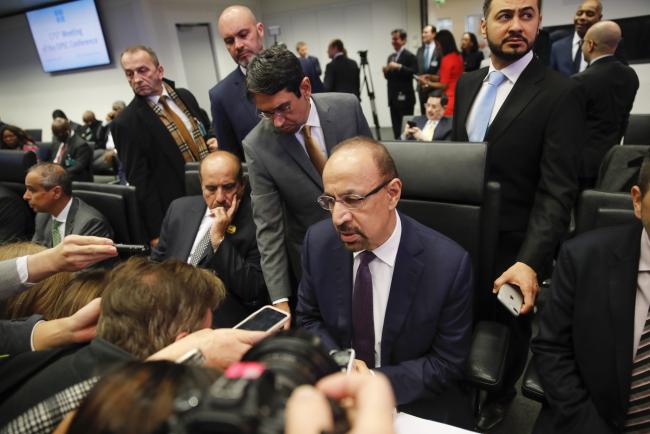(Bloomberg) -- Saudi Arabia proposed a moderate oil-production cut from OPEC and its allies that would nudge the market back into balance, seeking to walk a fine line between preventing a surplus and appeasing U.S. President Donald Trump.
“We in the kingdom are going to be advocating something adequate to balance the market,” Energy Minister Khalid Al-Falih told reporters at the opening session of the group’s meeting in Vienna on Thursday. A cut of about 1 million barrels a day from the whole group should be adequate and “certainly we don’t want to shock the market.”
Events in the Austrian capital weren’t the only story on Thursday. As ministers sat down at the headquarters of the Organization of Petroleum Exporting Countries, Russian Oil Minister Alexander Novak flew to St. Petersburg to meet President Vladimir Putin to decide on their country’s contribution. If the group’s most important ally in the broader OPEC+ coalition decides to make a sizable cut, the cartel will follow up.
Saudi Arabia is equally prepared for a deal or no-deal situation, Al-Falih said. “If everybody is not willing to join and contribute equally, we will wait until they are.”
Negative Reaction
Oil fell in London after the remarks, losing as much as 5.2 percent to $58.36 a barrel, before paring losses to $60.11 at 12:27 p.m.
Investec Bank Plc’s head of commodities Callum MacPherson said a 1 million barrel a day production cut could lift the market if OPEC’s allies are also bought in, given the speed of Iranian losses due to U.S. sanctions. For now, the market is reacting to "the muddle" in OPEC’s messaging "combined with a horrible fall in equities," he said.
Saudi Arabia, OPEC’s de facto leader, has made clear that it won’t shoulder the burden of trimming production alone. In private conversations, delegates said a consensus was emerging around an overall cut, including Russia, of around 1 million barrels a day, although all cautioned the figure wasn’t final.
The wait for Moscow signals how much OPEC has changed since 2016 when Saudi Arabia and Russia ended their historic animosity and started to manage the oil market together. The alliance has transformed OPEC into a duopoly in which Russia, which isn’t a formal member of the cartel but part of the production cuts alliance, is asserting its power.
Russian Resilience
While Middle Eastern producers are desperate to reverse the recent slump in prices to pay for government spending, sensitivities are different in Russia, where the government is running a budget surplus and a weak ruble mitigates the impact of lower prices. The government is concerned about the impact of higher prices on Russian consumers, stoking discontent with economic policy, according to one Kremlin official.
A day of preliminary talks in the Austrian capital on Wednesday concluded with a panel led by Saudi Arabia and Russia recommending an output reduction lasting six months, but the committee didn’t discuss how big any cuts should be. Al-Falih said his preference was for a reduction extending into the third quarter.
The group may agree a formal cut of under a million barrels a day, Nigeria’s oil minister, Emanuel Kachikwu said in a TV interview on Thursday morning.
OPEC is also contending with vociferous opposition from the U.S. president, who’s taken to using his Twitter account to berate the group’s policies and sees low oil prices as key to sustaining America’s economic growth.
While ministers met in OPEC’s Vienna headquarters on Wednesday, Trump tweeted that the “world does not want to see, or need, higher oil prices!”
“I’m cautiously optimistic that a deal gets done, but the devil will be in the detail,” said Mohammad Darwazah, a director at Medley Global Advisers. “How OPEC communicates this to the market may be just as important as what gets done.”
Although Russia, the largest producer in the wider group known as OPEC+, agreed to a cut in principle, the eventual size of their contribution remains undefined and will be key to putting together the final deal.
In private conversations earlier this week, OPEC delegates said that Saudi Arabia had favored a Russian cut of about 300,000 barrels a day, but Moscow was seeking a smaller reduction of about 150,000, said people familiar with those talks. Those differences persisted after Wednesday’s meeting, OPEC delegates said.
Russia’s second-largest oil producer, Lukoil PJSC, is ready to comply with any request from the Kremlin but hopes output cuts won’t be necessary, said Chief Executive Officer Vagit Alekperov.
“I hope that maybe these measures won’t be necessary,” he said in an interview with Bloomberg television in Vienna. An oil price around $60 suits the needs of producers and consumers and it should remain at that level in January, he said. If Russia does agree a cut, it would take three to four months to fully implement it, he said.
Iranian Exception
Iran is currently subject to U.S. sanctions and as such won’t participate in any curbs, the country’s oil minister, Bijan Zanganeh said.
The last time the OPEC+ group agreed to curtail output, in late 2016, it settled on a combined 1.8 million-barrel-a-day reduction. In preparatory meetings ahead of this week’s summit, delegates had said a cut of as much as 1.3 million barrels a day next year is needed as demand growth slows and U.S. shale production surges.
Resolving the group’s internal differences and convincing a skeptical oil market that they’re serious about preventing a new supply glut in 2019 would require ministers to conclude weeks of debate and settle on a final figure.
"Some countries will struggle because their economies are very constrained" and Nigeria itself could only manage a small cut, Kachikwu said.
(Updates with analyst comment in sixth paragraph.)
